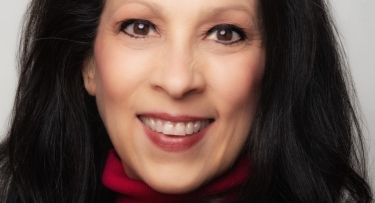Mercy Professor Shares Storytelling Research and Experiences with Teachers-in-Training

Wendy Mages, associate professor of early childhood and childhood education, has a lot of stories to tell.
In addition to her research and teaching roles in Mercy’s early childhood and childhood education program, Mages is a storyteller and storytelling coach, workshop leader, education researcher, and photographer. Embracing what’s called “the teacher-artist-researcher model,” central to Arts-Based Education Research, which utilizes the arts as a way of understanding and analyzing experience, she continually searches for new ways to apply what she has learned and to share it with her students.
“Using stories and performances to engage learners and help them understand complex concepts actually helps them to better retain and apply that information,” said Mages. She cited a recent neuroscience study that showed when a person is telling a story, certain areas of their brain light up. “Interestingly, the same parts of the listener’s brain light up, too,” she said. “I’m constantly looking for ways to harness the power of storytelling in my classes and apply it to other fields.”
Her work often crosses over into unexpected fields like science and health care. Last fall Mages led storytelling workshops for classes of nursing students and others entering the health care field. “Storytelling in a variety of fields, like nursing, business and science, is catching fire right now,” she said. “In the classroom, students from divergent backgrounds start relating to each other’s stories, and you can see a community developing before your eyes. Sharing stories removes barriers and allows everyone to be seen and heard.”
She described an approach that involves inviting family members into the classroom to tell family stories, or to invite students to tell the story of their given name. “It’s a subtle way for each person to share their heritage and culture with the whole class. When you know more about a person you have more affinity for them. That’s how you build community.”
When stay-home orders around the world led to the cancellation of many live storytelling events, it wasn’t long before they moved to online programming. This enabled Mages an even broader opportunity for participation, with virtual access to storytelling festivals, classes and workshops all over the world.
“I’ve performed stories and attended conferences and workshops with people from Maine to California, from Canada to South America, from India to Australia,” she said. “It’s been a deeply engaging learning experience to witness so many different styles and kinds of storytelling. It’s fascinating to see how a story can vary from one culture to another while remaining the same story. Moreover, evidence and insights from these international experiences serve to further validate the merits of storytelling research and pedagogy.”
This summer Mages led several virtual storytelling workshops including “Personal Storytelling Through Science” for middle school and high school students. Other events included the 24-Hour True Storytelling Festival Online and The Greenwich Historical Society’s Story Barn Online. One of her photographs was featured in the Arts in Education Virtual Exhibition 2020 at the Harvard Graduate School of Education Gutman Gallery, and she was invited to tell a story about the photograph.
